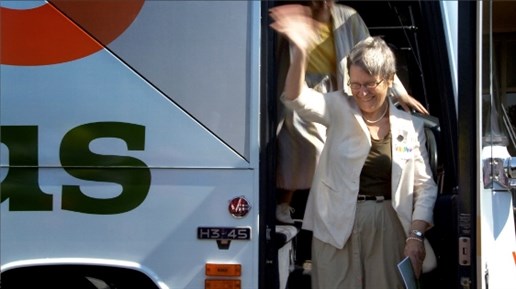By providing your information, you agree to our Terms of Use and our Privacy Policy. We use vendors that may also process your information to help provide our services. This site is protected by reCAPTCHA Enterprise and the Google Privacy Policy and Terms of Service apply.
Reality Checks: Do Celebrity Supporters like Brad Pitt and Eva Longoria Actually Help Documentaries?
Anthony Kaufman

What do Brad Pitt, Leonardo DiCaprio, and Eva Longoria all have in common?
They’re all executive producers on recent documentary feature films. While celebrities such as these may not be known for their nonfiction filmmaking, they’re joining an increasing list of A-list talent attaching themselves to theatrical documentaries in order to catapult a film and its issues to a larger audience. But does the strategy always work?
 For the release of Matthew Heinemann’s intense chronicle of violence and vigilantism along the Arizona/Mexican border, “Cartel Land,” on July 3, for example, acclaimed director Kathryn Bigelow recently signed her name onto the project. According to Paul Davidson, SVP at The Orchard — which is releasing “Cartel Land” — Bigelow was an early supporter of the film, and will host screenings and speak on its behalf. “I would say that Kathryn’s track record and award-winning filmmaking is world renowned and her involvement as EP on the movie definitely compliments the filmmaking of our director,” Davidson added.
For the release of Matthew Heinemann’s intense chronicle of violence and vigilantism along the Arizona/Mexican border, “Cartel Land,” on July 3, for example, acclaimed director Kathryn Bigelow recently signed her name onto the project. According to Paul Davidson, SVP at The Orchard — which is releasing “Cartel Land” — Bigelow was an early supporter of the film, and will host screenings and speak on its behalf. “I would say that Kathryn’s track record and award-winning filmmaking is world renowned and her involvement as EP on the movie definitely compliments the filmmaking of our director,” Davidson added.
READ MORE: Why is Brad Pitt’s New Documentary Struggling at the Box Office?
Two weeks later, Joshua Oppenheimer’s “The Look of Silence” will be released with executive producers Errol Morris and Werner Herzog on board. Unlike a number of other recent examples, the two legendary documentary filmmakers came onto Oppenheimer’s films “The Act of Killing” and “The Look of Silence” well before the movies were complete. But upon the films’ releases, the two famous documentary filmmakers’ stamp of approval functions as an excellent source of promotion.
“If you’re a fan of documentary films, the credibility of having Errol Morris and Werner Herzog means so much as they are among the most respected sources in the small industry of documentary film,” said Tim League, head of Drafthouse Films, distributor of both “The Act of Killing” and “The Look of Silence.”
 “I don’t know if it’s crucial, but it’s much appreciated,” continued League, referring to celebrity endorsements. “Docs are review driven and word-of-mouth driven, but obviously when you have established names, it helps that initial surge of ticket sales, which helps with word-of-mouth.”
“I don’t know if it’s crucial, but it’s much appreciated,” continued League, referring to celebrity endorsements. “Docs are review driven and word-of-mouth driven, but obviously when you have established names, it helps that initial surge of ticket sales, which helps with word-of-mouth.”
Studies of consumer behavior suggest that having recognizable names on board a project can help significantly. As Emily Verellen, Senior Director of Programs at The Fledgling Fund, told Indiewire, “Research and even basic observation shows that people are increasingly connected through and influenced by ‘fandoms.’ Whether we know it or not, these fandoms influence how we act, think, dress, consume, vote and make just about every other decision — so much more than traditional advertising and marketing might.”
“For documentary films,” Verellen continued, “having social influencers on board as executive producers or in any capacity provides an undeniable gift of gravitas among their huge and diverse group of followers. Activating fandoms to support a film’s theatrical, broadcast or digital release is an incredible gift that influencers offer.”
Because of this arguably significant impact, Fledging recently launched its first Fledgling Engagement Lab, which brought together eight social issue documentary film teams along with experts and mentors over the course of 12 to 18 months. The fruits of their labors can be seen on the credits of a handful of documentary success stories, from Leonardo DiCaprio coming on as an executive producer of Oscar-nominee “Virunga” to Eva Longoria’s backing of “Food Chains,” a documentary about farm and food laborers.
Verellen also cited Katie Couric as instrumental to the success of “Fed Up.” “Her presence was a catalyst for a high box office, but also fantastic social issue engagement with the ‘Fed Up Challenge’ that challenged audiences to remove sugar from their diet for 10 days,” she said. Another Fledging Fund grantee “Gasland” benefited from the celebrity support of Mark Ruffalo, who helped to organize screenings, and spoke on panels and at screenings about the film to help draw attention to the issue of fracking.
But having a celebrity executive producer doesn’t automatically translate to distribution deals, ticket sales or a broader reach.
“We have not seen that they make any difference in commercial viability or the audience excitement about a film,” said Impact Partners’ Dan Cogan, a prolific documentary producer and executive producer. “If a celebrity EP is going out to do work, do interviews, and do ‘grass-tops’ screenings, then I think it could be hugely valuable, but just a name on a credit block,” he added, “I don’t think that’s valuable.”
 For Cogan, celebrities are only meaningful if they’re really involved.
For Cogan, celebrities are only meaningful if they’re really involved.
Another Fledgling Fund Engagement Lab participant, “Radical Grace,” about progressive Catholic nuns, was able to get Susan Sarandon on board as an executive producer. But although the actress’ name has made people take notice of the documentary, according to the filmmakers, it has not been a gamechanger as the film has sought a distribution partner. “Sarandon’s involvement in the film hasn’t been the primary focus of our conversations with distributors,” said producer Nicole Bernardi-Reis, “although everyone is excited about her involvement and the awareness she brings to the project.”
Even with one of the biggest celebrities in the world, last year’s theatrical release of Rachel Boynton’s masterful examination of the machinations of the global oil business, “Big Men,” for example, didn’t perform well at the box-office. Though Brad Pitt signed on as an EP early on and hosted a special screening in L.A., timed with the film’s opening, “Big Men” was a slow burn commercially.
Still, Boynton said that Pitt’s involvement was crucial during the several years it took to make the project. “I do think it helped financiers, oil men and militants take the film more seriously,” she said. “Basically, it makes people feel like your film will be taken seriously by the world when it’s finished. And that can be the difference between getting a ‘no’ and getting a ‘yes.'”
READ MORE: Reality Checks: Documentaries Struggle For Relevance in Changing Times
By providing your information, you agree to our Terms of Use and our Privacy Policy. We use vendors that may also process your information to help provide our services. This site is protected by reCAPTCHA Enterprise and the Google Privacy Policy and Terms of Service apply.

















